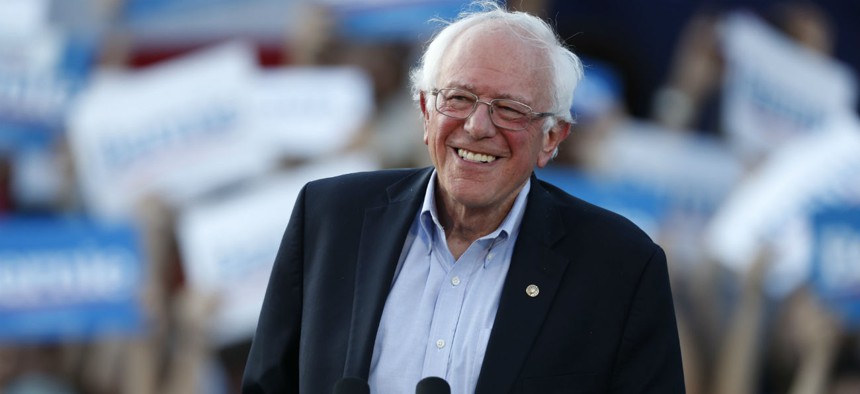Bernie Sanders Announces Plans to Break Up Homeland Security Dept. and Expand VA
DHS is an aimless "bureaucratic behemoth," Sanders says, while VA is on a path toward privatization.
One of the top 2020 Democratic presidential contenders has unveiled plans in recent days to overhaul two of the three largest federal agencies, promising to siphon off major components of one while dramatically expanding the other.
Sen. Bernie Sanders, I-Vt., on Friday released a proposal to break up the Homeland Security Department by sending many of its core functions to other agencies. Sanders called DHS a “bureaucratic behemoth” that has lost a “clearly defined mission.” To tackle the “bloat,” Sanders suggested moving many of the department’s component agencies.
Deportation and immigration enforcement responsibilities, currently the primary function of Immigration and Customs Enforcement, would move over to the Justice Department. They would be joined there by border personnel, currently a part of Customs and Border Protection. CBP’s customs authority would transfer to the Treasury Department. Naturalization and citizenship programs, currently the responsibility of U.S. Citizenship and Immigration Services, would shift to the State Department. Prior to the creation of DHS in 2003, many of the functions Sanders would relocate fell under the Immigration and Naturalization Service within the Justice Department.
“It is long past time we break up the Department of Homeland Security and refocus its mission on keeping our country safe and responding effectively to emergencies,” Sanders said, accusing President Trump of turning CBP and ICE into a “renegade detention and deportation force.” Sanders vowed to overhaul the recruiting strategies for what are currently CBP positions by promoting a focus on a “humanitarian mission, not a law enforcement mission.”
The DHS workforce has grown by about 14% to 206,000 employees since it was first created.
To coincide with Veterans Day, Sanders on Monday unveiled his plan to overhaul the Veterans Affairs Department. Sanders formerly served as the chairman and later ranking member of the Senate Veterans' Affairs Committee, and co-authored the 2014 Veterans Choice Act that significantly expanded veterans access to private care. Passed in the wake of a national scandal involving secret lists to obscure how long veterans waited for VA services, the law also made it easier—temporarily, until the provision was struck down in court—to fire the department’s Senior Executive Service employees. In announcing the new plan, the Sanders campaign highlighted the senator’s role in passing the reform as it secured funding for new facilities and staffing, without mentioning the expansion of private care or the new firing authorities.
Instead, Sanders promised not to “dismantle or privatize the VA,” and highlighted his opposition to the 2018 VA Mission Act that Trump signed into law last year. That law consolidated various “community care” programs and made it easier for some veterans to receive private health care on the government’s dime. While the Trump administration has repeatedly pushed back on the notion that it is trying to privatize the department by highlighting the growing number of veterans going to government-run facilities and the high marks those centers receive, Sanders blasted the Mission Act as a thinly veiled privatization effort that is “leading to a massive budget shortfall in every region in the country.”
Sanders pledged to fill the nearly 50,000 VA vacancies in his first year in office, which the department has struggled to do for years due to what it calls normal attrition in the health care sector. To support the nearly 400,000-employee workforce and recruit new staff, Sanders said he would improve whistleblower protections, end “anti-union attacks,” boost staffing ratios and bump compensation so it is more competitive with the private sector.
Sen. Elizabeth Warren, D-Mass., one Sanders’ rival for the Democratic nomination, also promised in her veterans plan she released last week to “work with Congress” to fill the department’s vacancies, including through the expansion of flexible hiring authorities. Unlike Sanders, however, she vowed to “fully implement” the Mission Act.
Sanders promised $62 billion in new funding for VA to open new health care facilities and repair and update existing ones. He also vowed to expand services such as vision, dental and long-term care, as well as to enable the department to prescribe medical marijuana.




